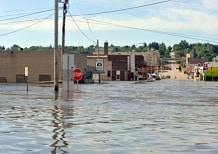The first thing we are going to do to know the meaning of the term flood is to discover its etymological origin. In this case, we can state that it derives from Latin, exactly from "inundatio", which is the result of the union of the following lexical components:
-The prefix «in-«, which means «inwards».
-The noun "unda", which is synonymous with "wave".
-The suffix "-cion", which is used to indicate "action and effect."
Flood is the act and consequence of flooding : covering with water or other liquid.
 The concept is usually used when water covers an area that is usually dry . Floods can be caused by torrential rain, the overflowing of a river, an extraordinary rise in the tide or a tsunami , for example.
The concept is usually used when water covers an area that is usually dry . Floods can be caused by torrential rain, the overflowing of a river, an extraordinary rise in the tide or a tsunami , for example.
Flood, flood, alluvium , avalanche, flooding or overflow are some of the words that can function as synonyms for flood. On the contrary, among its antonyms we find terms such as drought, lack or scarcity.
Many times a flood is a catastrophe . The major floods cause numerous fatalities and enormous material damage, leaving thousands of people homeless due to the advance of the water.
To avoid flooding, cities have various defense mechanisms according to the characteristics of the area. Drainage systems, reservoirs , dikes and barriers are some of the resources that help prevent land from flooding.
Those who have to face a flood are required to take a series of measures to save their lives:
-They must cut off the electricity, water and all supplies of the house in which they are located.
-It is essential to evacuate the home. If you are outside, the ideal is to climb to the highest possible level of the house and if you are inside, access the highest part of it.
-If you are in a car you should try to turn around and go in the opposite direction to where the flooded area is. However, if that vehicle is stuck, the option will be to try to get out of it and get to a high place.
-Likewise, you should not go near light poles or cables while you should avoid crossing river beds at all times.
In 2013 , to mention a recent historical event, the City of Buenos Aires , La Plata and other towns in the Province of Buenos Aires ( Argentina ) suffered a significant flood. For three days, between April 1 and 3, intense rains were recorded that overwhelmed the cities ' drainage capacity. The water, in this way, covered the streets and entered numerous houses and buildings, leaving more than a hundred dead.
In a symbolic sense, the idea of flooding is used to refer to an excessive or infrequently high level of something. A journalist can affirm that, after a failure in the electrical service that affected thousands of users, the Consumer Protection Office of a city received a "flood of complaints" for damage to appliances.
